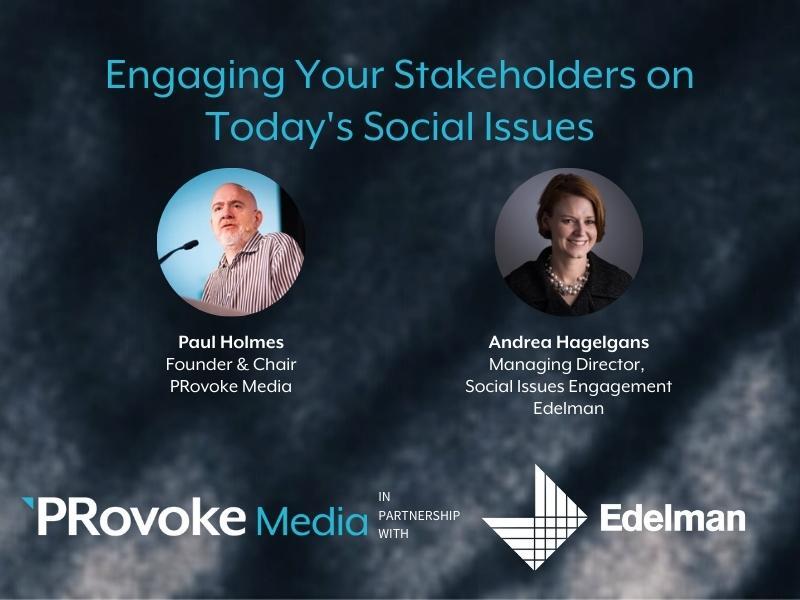PRovoke Media 21 Jul 2022 // 4:16PM GMT

Over the past few years, companies have been under pressure from their various stakeholders — employees, customers, investors, the communities where they operate — to take a public stand on high-profile social and political movements. And, there have been many movements to talk about – Black Lives Matter, abortion laws, LGBTQ+ rights, to name a few. But many company leaders aren’t sure what the right move is. Should they speak out on social impact issues or quietly stay on the sidelines?
In this PRovoke Media Podcast, Andrea Hagelgans, managing director of social engagement issues for Edelman, shares why, when and how to take positions on social issues. It is of course impossible and impractical for companies and executives to speak out on every issue, so Hagelgans details where to get started to make sure you’re strategic and not making moves that could negatively impact your reputation.
“For so many years, there was this rule that you don’t want to overstep as a business and speak out on issues that might not be directly related to the business,” Hagelgans said in the podcast. “What has changed is you are now seeing generational differences in what employees expect of their company. Our Edelman Trust Barometer shows that people want companies to engage more on societal issues, not less.”
Data from this year’s Edelman Trust Barometer reveals that business holds onto its position as the most trusted institution, with even greater expectations due to government’s failure to lead during the pandemic. By an average of five-to-one margin, respondents in the 28 countries surveyed want business to play a larger role on climate change, economic inequality, workforce reskilling and addressing racial injustice. All stakeholders want business to fill the void, with nearly 60 percent of consumers buying brands based on their values and beliefs, almost 6 in 10 employees choose a workplace based on shared values and expect their CEO to take a stand on societal issues, and 64 percent of investors looking to back businesses aligned with their values.
“What employees crave most is clarity on your values,” Hagelgans said. “And they want to see that it is not just an external statement, it’s not just a marketing ploy, but it actually is something that the organization is living and breathing.”
Edelman has a framework in place to help companies navigate social issues and whether they should speak out. Hagelgans said this kind of structure — which will require you to answer questions such as “Does this issue align with our company strategy?” — helps make sure you’re stepping into the right conversations. Her recommendation to get started with this approach and ensure the right internal stakeholders are involved. While its true that companies need to understand that expectations of business are changing, you need to make smart moves in the evolution or your reputation could be at risk.
Topics include:
0:00: Introductions
1:10: The Dayton Hudson Story: How it Began
06:32: What has Changed in the Past 30 Years?
14:52: The Gen Z Effect on Social Change
16:49: The Two Approaches Your Organization Can Take
22:41: Edelman’s Social Issues Navigator Tool
26:28: Who Needs to Be in the Room Where it Happens?
32:24: Are Social Issues a Distraction or Opportunity for Leadership?
34:10: The Definition of CEO in 2022



































.jpg)


















